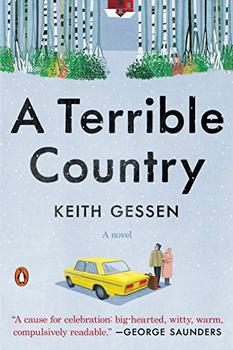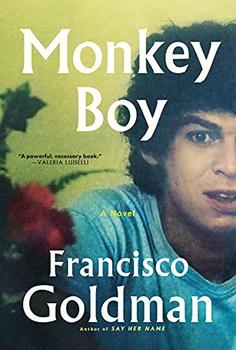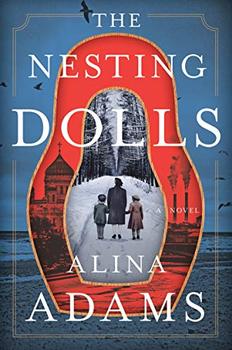Summary | Excerpt | Reviews | Beyond the book | Read-Alikes | Genres & Themes | Author Bio

A Novel
by Keith GessenA Terrible Country is set in Russia circa 2008 during the presidency of Dmitry Medvedev, who ruled briefly between Vladimir Putin's two terms, and was viewed by many as a "puppet" president, a tool used by Putin to flout term limit laws. Andrei Kaplan, a young man living with his grandmother in downtown Moscow – a stone's throw from the former headquarters of the KGB – is the central character of this novel which explores the confluence of past and present, and with it, socialism and capitalism. One of Andrei's politically radical friends draws this parallel astutely, remarking, "there is a dictator that is as tough as Stalin and as brutal as Stalin but is also more acceptable than Stalin, more popular than Stalin ever was. It's called the market."
Andrei moves to Moscow to look after his 90-year-old grandmother after his brother Dima, her former caretaker, is forced to flee the city under suspicion of being a political radical. Having emigrated to America with his family at age 6, Andrei feels, upon arrival back in his home country, that he is not quite Russian enough to belong in Moscow, and has trouble finding a social circle. He is professionally frustrated as an out-of-work Russian literature academic, watching on Facebook as his former college classmates are hired to teach at prestigious universities. But this changes after a few chance meetings with members of a radical socialist collective who are determined to stand up against unfettered capitalist excess in Russia, particularly as it pertains to the oil industry and its controlling oligarchs. One of the group's members is an activist named Yulia who Andrei quickly falls for. Then Dima begins pressuring Andrei to sell his grandmother's apartment, where she has lived her entire life, and hire a full-time nurse, offering Andrei the opportunity to return to America just when he is becoming comfortable in his new life.
Keith Gessen who, like Andrei, emigrated to the United States aged six (along with his sister, journalist and Putin critic Masha Gessen), depicts post-Soviet Union Russia in all its odd contradictions. McDonald's franchises and expensive coffee shops are ubiquitous, while subway stations feature statues of Lenin and Marx. Andrei hopes to publish an article about the state of Russia as he finds it, but quickly realizes he is out of his depth: "What was the situation? I couldn't tell! It was some kind of modern authoritarianism. Or authoritarian modernization. Or something." He finds the ideas of the radical socialist group he encounters appealing, while also recognizing that socialism has failed Russia before. His grandmother, Seva Efraimovna, is a living reminder of this fact.
Having lost two husbands, a successful filmmaking career, her only child, and now suffering from dementia, Seva Efraimovna is a truly tragic figure, and Gessen portrays her with grace and sensitivity. She is a "ghost haunting her own life," repeatedly uttering a heartbreaking refrain: "All my friends have died." Andrei's devotion to her, and to his newfound cause and country, are admirable, even as it becomes gradually more apparent that he will never fully commit to them.
The novel is sprawling; Gessen includes details that some might find mundane or superfluous, descriptions of hockey matches, a play-by-play of Andrei unclogging the kitchen sink and cooking kasha, and a long description of a documentary about the poet Tsvetaeva. However, these scenes serve purposes: providing the reader with Russian historical background, or illustrating Andrei's growing affinity for his native land, idiosyncrasies and all. At its core, A Terrible Country is about feeling alien, and how it is possible to use that alienation to one's advantage. It is moving, troubling, and even funny on occasion, in a particularly Russian way that will appeal to fans of Dostoevsky and Gogol. While the ending is a little unsatisfying, it is true to its protagonist, and makes narrative sense. Furthermore, it is apt; Russian literature is not known for happy endings.
![]() This review was originally published in The BookBrowse Review in September 2018, and has been updated for the
September 2019 edition.
Click here to go to this issue.
This review was originally published in The BookBrowse Review in September 2018, and has been updated for the
September 2019 edition.
Click here to go to this issue.

If you liked A Terrible Country, try these:

by Francisco Goldman
Published 2022
Francisco Goldman's first novel since his acclaimed, nationally bestselling Say Her Name (winner of the Prix Femina étranger), Monkey Boy is a sweeping story about the impact of divided identity - whether Jewish/Catholic, white/brown, native/expat - and one misfit's quest to heal his damaged past and find love.

by Alina Adams
Published 2021
Spanning nearly a century, from 1930s Siberia to contemporary Brighton Beach, a page-turning, epic family saga centering on three generations of women in one Russian Jewish family - each striving to break free of fate and history, each yearning for love and personal fulfillment - and how the consequences of their choices ripple through time.
Your guide toexceptional books
BookBrowse seeks out and recommends the best in contemporary fiction and nonfiction—books that not only engage and entertain but also deepen our understanding of ourselves and the world around us.